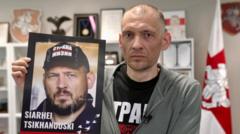As Ivory Coast approaches a critical presidential election, the candidacy of Tidjane Thiam, a former international business executive, encounters a significant barrier following a court ruling that threatens his participation due to citizenship complications. The situation highlights deeper issues related to identity politics and the overarching democratic credibility of the nation.
### Ivory Coast's Political Identity Crisis: A Threat to Democracy?

### Ivory Coast's Political Identity Crisis: A Threat to Democracy?
In the lead-up to Ivory Coast's presidential elections, former finance executive Tidjane Thiam faces disqualification due to citizenship issues, shaking the foundations of democratic representation in the nation.
The rapid progress towards the elections this October came to a standstill on April 22, when a judge ruled that Thiam had lost his Ivorian citizenship after acquiring French nationality decades ago, without revoking it in time for the elections. Thiam, who returned to Ivory Coast in 2022 after a successful global career, was seen as a strong presidential candidate, especially after being named the opposition Democratic Party's representative following the death of former leader Henri Konan Bédié.
Thiam's background, including his noble lineage and prior governmental experience, positioned him as a competent alternative to incumbent President Alassane Ouattara, who is expected to run for a fourth term amid a growing disillusionment with the political establishment.
The court's decision deprives Thiam of standing in the elections, joining other opposition figures who have faced exclusions due to previous convictions. This development raises concerns that Ouattara's successor may face little substantial opposition, potentially further eroding public confidence in the country's political system. Popular discontent, especially amongst the youth, has been brewing in West Africa, ignited by recent military coups in Mali, Burkina Faso, and Niger.
Despite the challenging political landscape, there have been successful democratic transitions in neighboring countries such as Liberia, Senegal, and Ghana, inspiring hopes for Ivory Coast to join this wave of positive change. However, the resurgence of divisive identity politics reminiscent of the country's tumultuous past poses a serious threat to democratic integrity.
Ivory Coast's continued struggle with citizenship laws mirrors past conflicts rooted in "ivoirité," a concept that once restricted presidential eligibility based on perceived foreign lineage. The current scenario underscores the resilience of such identity issues, with Thiam's predicament exemplifying how citizenship laws could serve as modern-day instruments of political exclusion.
In his defense, Thiam has highlighted the absurdity of these regulations by drawing parallels with the national football team's dual nationality, prompting questions about the application of citizenship laws in a global context. As legal debates unfold, Thiam’s fate hangs in the balance, alongside the other barred candidates, leading to uncertainty about the impending election.
In light of the current complexities, President Ouattara's potential decision to intervene could prove pivotal in shaping the democratic future of Ivory Coast, yet the prospects remain tenuous as the October polls approach. The unfolding events signal a critical juncture for the country's democracy, one that could either reinforce stability or deepen the reliance on politically divisive rhetoric.
Thiam's background, including his noble lineage and prior governmental experience, positioned him as a competent alternative to incumbent President Alassane Ouattara, who is expected to run for a fourth term amid a growing disillusionment with the political establishment.
The court's decision deprives Thiam of standing in the elections, joining other opposition figures who have faced exclusions due to previous convictions. This development raises concerns that Ouattara's successor may face little substantial opposition, potentially further eroding public confidence in the country's political system. Popular discontent, especially amongst the youth, has been brewing in West Africa, ignited by recent military coups in Mali, Burkina Faso, and Niger.
Despite the challenging political landscape, there have been successful democratic transitions in neighboring countries such as Liberia, Senegal, and Ghana, inspiring hopes for Ivory Coast to join this wave of positive change. However, the resurgence of divisive identity politics reminiscent of the country's tumultuous past poses a serious threat to democratic integrity.
Ivory Coast's continued struggle with citizenship laws mirrors past conflicts rooted in "ivoirité," a concept that once restricted presidential eligibility based on perceived foreign lineage. The current scenario underscores the resilience of such identity issues, with Thiam's predicament exemplifying how citizenship laws could serve as modern-day instruments of political exclusion.
In his defense, Thiam has highlighted the absurdity of these regulations by drawing parallels with the national football team's dual nationality, prompting questions about the application of citizenship laws in a global context. As legal debates unfold, Thiam’s fate hangs in the balance, alongside the other barred candidates, leading to uncertainty about the impending election.
In light of the current complexities, President Ouattara's potential decision to intervene could prove pivotal in shaping the democratic future of Ivory Coast, yet the prospects remain tenuous as the October polls approach. The unfolding events signal a critical juncture for the country's democracy, one that could either reinforce stability or deepen the reliance on politically divisive rhetoric.





















